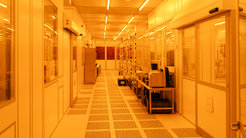SUPREME
The Max Planck Society's Semiconductor Laboratory will be part of one of the key production sites of the first EU pilot line for superconducting quantum chips
The European Union has approved SUPREME, a major new pilot line to industrialize the production of superconducting quantum chips, coordinated by VTT (Technical Research Centre of Finland) and funded by the EU Chips Joint Undertaking.
As part of this initiative with 22 other partners from eight EU Member States, one of the three central manufacturing sites will be located in Germany, in particular in Garching and the greater Munich area, supported by a strong consortium of German research institutions and technology developers:
- Peak Quantum
- TUM & Walther-Meißner-Institut (WMI)
- Halbleiterlabor der Max-Planck-Gesellschaft (HLL)
- Infineon Technologies AG
- Fraunhofer Gesellschaft (EMFT, IZM, IPMS, IAF)
- Leibniz Institute of Photonic Technology (IPHT)
This collaboration is empowered by the Munich Quantum Valley ecosystem, enabling close coordination between academic research, applied technology development, and industrial-scale fabrication.
SUPREME will develop and validate high-yield processes for superconducting quantum chips, focusing on technologies such as angle-evaporated and etched Josephson junctions, 3D integration, and hybrid quantum processes. These fabrication techniques are critical to scaling quantum processors, sensors, and communication components beyond laboratory prototypes.
The first validated processes are expected to be made accessible to external users via shared process design kits (PDKs) by 2027, laying the foundation for a European supply chain for quantum chips.
SUPREME marks a turning point for quantum hardware in Europe: transitioning from research to industrial capability and enabling broad access to reliable superconducting fabrication platforms for startups, SMEs, academia, and large industry alike.

About SUPREME:
SUPREME (Superconducting European Quantum Pilot Line) is a six-year effort to industrialise superconducting quantum chip fabrication in Europe. Coordinated by VTT (Finland) and funded by the EU Chips Joint Undertaking, it brings together 23 partners from 8 EU member states, with three main fabrication sites in Finland, Germany, and the Netherlands to be established.
About the Semiconductor Laboratory:
The Semiconductor Laboratory (HLL) of the Max Planck Society originated in the 1980s and has been an independent central facility since 2013. HLL develops and produces custom silicon-based radiation sensors that are tailored to the needs of cutting-edge research in particle physics, astrophysics, and materials science, covering all steps from concept to fabrication. Its technologies are used in major experiments and missions such as ATLAS, BELLE II, XMM-Newton, eROSITA, euXFEL. As part of the Munich Quantum Valley, HLL is now expanding its expertise in nanoscale technologies.
Further information:
https://www.elektronikforschung.de/foerderung/bekanntmachungen/chipsju
https://www.chips-ju.europa.eu/News/
Contact:
Halbleiterlabor der Max-Planck-Gesellschaft
Dr. Jelena Ninkovic
Isarauenweg 1
85748 Garching
+49 (0)89 839400 -49
